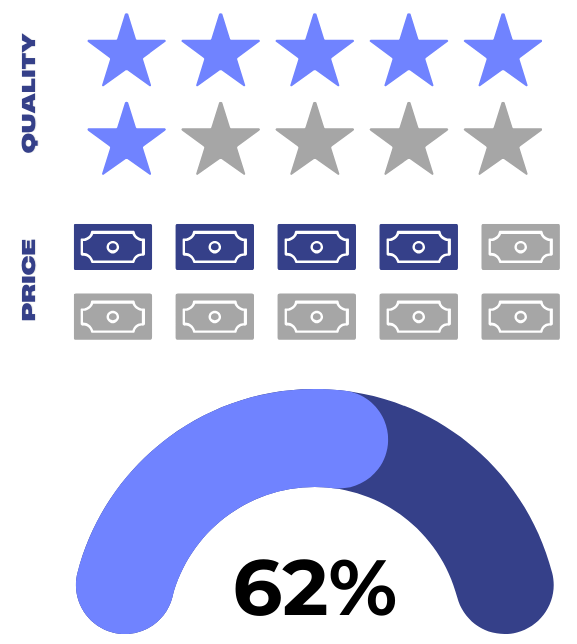A Dream Takes Root
"It takes a village to raise a child—and a family to nurture a dream."
Entrepreneurial journeys often start with a passion, but it’s the support of close relationships that helps turn that passion into something real. In places where resources are limited and challenges are common, the trust and practical help that come from family and close networks often provide the foundation needed to move forward. Faith and family support are central parts of this social capital, offering not just encouragement but also the tools to deal with everyday obstacles.
In Pakistan, cultural norms place a strong emphasis on family as a central pillar of support, particularly in times of uncertainty. According to a study by Gallup Pakistan, over 70% of entrepreneurs in the country cite family as their primary source of emotional and financial backing when starting a business. This reliance is especially critical in an environment where formal mentorship programs and access to venture capital remain limited, making familial networks a practical solution to bridge resource gaps.

Fahad’s story is no exception
After graduating from college, Fahad was looking for a way to put his energy into something meaningful. Baking, a hobby he had enjoyed for years, became his focus. With just Rs. 10,000 and access to his family’s small kitchen, he started experimenting with cinnamon rolls. But he wasn’t working alone. His mother, who believed in his vision, played a key role. She helped him source affordable materials, gave practical advice, and supported him every step of the way. What started as a small project in their kitchen soon began to look like the start of a real business, thanks to her involvement.
Fahad’s story shows how family support goes beyond encouragement. His mother’s help with logistics and her belief in him gave Fahad the confidence to keep going, even when things were tough. Her involvement made it possible to turn his small idea into something bigger.
The start of Fahad’s journey highlights one of the key aspects of social capital: the role of close family ties in bridging resource gaps. Without access to formal funding or professional mentorship, Fahad relied on the trust, skills, and shared commitment of his family. Their practical help, combined with emotional support, provided the foundation he needed to start building his business. This early stage demonstrates how strong family relationships can act as a safety net, enabling entrepreneurs to take their first steps despite limited resources. By leveraging these bonds, Fahad was able to turn initial constraints into opportunities, setting the stage for the growth to come.
From Challenges to Breakthroughs
"In the middle of difficulty lies opportunity."
Every entrepreneur faces challenges, but it is often how these challenges are approached that defines the outcome. For Fahad, the journey of scaling Big Fat Rolls was no different. With limited resources and growing demands, he encountered obstacles at every step. Yet, with the unwavering support of his family and a commitment to his craft, he found ways to turn these hurdles into stepping stones.
1- Maintaining Quality While Scaling
As demand for his cinnamon rolls grew, Fahad faced the challenge of maintaining the quality that set his products apart. Scaling production risked losing the personal touch and consistency his customers valued. Fahad’s mother became an integral part of the process, stepping in as a quality control partner. Together, they ensured that every batch adhered to the same high standards as the original. Her attention to detail allowed Fahad to scale production without compromising on the elements that defined his brand.
Maintaining quality during business expansion is a common hurdle for food entrepreneurs. In Pakistan’s competitive food industry, where consumer preferences increasingly favor artisanal and homemade products, consistency becomes a key differentiator. A 2021 Nielsen report found that 62% of urban Pakistani consumers prioritize quality over price when choosing food products, emphasizing the critical role of maintaining standards in scaling operations.

2- Logistical Hurdles
Expanding beyond Lahore introduced logistical challenges, particularly in ensuring the cinnamon rolls arrived fresh and intact. Delivering perishable goods over long distances required innovation and precision.Fahad collaborated with his family to rigorously test packaging solutions. They simulated rough handling to identify materials that could protect the product’s freshness. With these packaging innovations, Fahad was able to expand his delivery reach while maintaining customer satisfaction.
3- Financial Constraints
Starting with just PKR 10,000 meant Fahad had to make every rupee count. Limited funds created significant pressure as he worked to grow the business.
Fahad relied on his family’s skills to overcome financial limitations. His brother designed a website at no cost, giving him an online presence, while his mother’s knack for sourcing affordable materials kept expenses under control. These contributions amplified his resources and allowed him to stretch his budget without sacrificing growth opportunities.
Limited access to formal financing is a widespread issue in Pakistan, where, according to the State Bank of Pakistan, only 7% of SMEs receive loans from financial institutions. This forces entrepreneurs to rely on personal savings and family resources.
4- Emotional Challenges
The emotional toll of entrepreneurship, including self-doubt and moments of uncertainty, tested Fahad’s resolve throughout his journey.Fahad found strength in his family’s unwavering belief in him. His mother’s quiet confidence in his vision gave him the reassurance to persevere, even during tough times. This emotional support became a critical element of his ability to move forward when challenges seemed overwhelming.
Each of these challenges demonstrates the power of social capital in entrepreneurship. Fahad’s family provided more than encouragement—they offered practical solutions, trust, and shared commitment that bridged gaps in funding, expertise, and infrastructure. By leveraging these relationships, Fahad turned potential setbacks into opportunities for growth. His story shows that in the absence of formal systems, strong networks can serve as a critical resource for overcoming adversity and building a foundation for success.
Leveraging Networks to Accelerate Growth
"A successful man is one who can lay a firm foundation with the bricks others have thrown at him."
– David Brinkley
As Fahad navigated the early stages of his business, his network extended beyond his family. With Big Fat Rolls gaining momentum, Fahad began leveraging relationships strategically to expand his reach, build trust, and create opportunities for growth. Each decision reflected the power of social capital, as his ability to connect with others became a key driver of success.
1- Building Customer Loyalty Through Thoughtful Gestures
Fahad recognized early on that creating a loyal customer base required more than just great products. To build trust and deepen relationships, Fahad included personalized handwritten notes with every order. These small, thoughtful gestures resonated deeply with his customers, turning transactions into meaningful connections. Over time, this approach fostered loyalty, encouraging repeat business and word-of-mouth referrals.
By creating these personal connections, Fahad effectively tapped into his customers’ trust and goodwill, building a community around his brand. This trust, an intangible asset, amplified his reach and strengthened his foundation for growth.
2- Trusting Timing and Patience
As opportunities for expansion presented themselves, Fahad chose to move carefully, trusting that the right time would come to scale further. Rather than rushing into expansion, Fahad took time to refine his craft and build operational stability. This patience paid off when a partnership opportunity with Baked, a popular brand, emerged. The collaboration helped expand Big Fat Rolls’ visibility and reach without straining his resources.
This decision underscores the importance of trust—not just in others but in the process. By building strong relationships with his family and community, Fahad positioned himself to capitalize on the right opportunities when they arose.
3- Expanding Reach Through Influencer Outreach
Fahad understood the importance of creating visibility for his brand and extending his network beyond immediate connections. Fahad sent PR packages to influencers, including actress Sara Khan. This strategic outreach introduced Big Fat Rolls to new audiences and significantly increased its visibility.
This step highlights how social capital can be expanded strategically. Fahad’s ability to establish trust and deliver a high-quality product enabled him to engage influencers effectively, leveraging their networks to grow his brand’s presence.
Influencer marketing has become a critical tool for small businesses in Pakistan, especially in food and lifestyle sectors. A report by Hootsuite indicates that 35% of Pakistani consumers discover new products through influencers on platforms like Instagram and Facebook. Collaborating with well-known personalities, such as Sara Khan, allows brands to tap into larger audiences and establish trust through social proof.

This stage of Fahad’s journey shows how social capital evolves and grows over time. By building trust with customers, leveraging strategic relationships, and strengthening his existing network, Fahad created a framework for sustainable growth. His story illustrates that social capital is not static—it is a dynamic resource that expands with intentional actions, allowing entrepreneurs to amplify their reach and create lasting impact.
Transforming Support into Measurable Success
"The strength of the team is each individual member. The strength of each member is the team."
– Phil Jackson
As Fahad’s business grew, the support from his network transformed into tangible results. What began as a close-knit family effort expanded into a customer-centric brand with operational innovations and measurable success. Fahad’s ability to rely on his network, maintain trust, and prioritize quality translated directly into the growth of Big Fat Rolls.
1- Operational Innovation
Scaling production while maintaining quality remained a central challenge, but Fahad’s meticulous approach and family collaboration led to operational breakthroughs. Fahad rigorously tested packaging durability to ensure freshness during shipping. Over time, his production capacity increased from one batch a day to five, meeting rising demand without compromising product quality.
These innovations were not achieved in isolation. Family members played critical roles in brainstorming solutions, testing ideas, and providing the hands-on support needed to implement them. This collaborative effort turned logistical challenges into strengths, reinforcing how social capital drives practical results.
2- Building a Customer-Centric Brand
Fahad’s focus on customer relationships became a hallmark of Big Fat Rolls, setting it apart from competitors and fostering organic growth. By leveraging social media, Fahad encouraged customers to share their experiences, creating a sense of community around the brand. This approach not only amplified visibility but also strengthened customer loyalty. Nationwide shipping further expanded his reach, making Big Fat Rolls a name recognized across regions.
The trust Fahad had built with customers—through personalized touches and consistent quality—was a direct product of his emphasis on relationships. Social capital here became a bridge between the brand and its audience, turning satisfied customers into brand advocates who fueled growth.
Social media has revolutionized customer engagement for small businesses in Pakistan, with platforms like Instagram and Facebook acting as key drivers of community-building. A 2022 Meta report revealed that 80% of SMEs in Pakistan use social media for customer engagement, and 60% attribute significant business growth to these platforms. Fahad’s strategy of fostering customer relationships through social media aligns with this broader trend, turning his followers into loyal advocates.

3- Achieving Independence and Long-Term Sustainability
After years of dedication, Fahad reached a key milestone: by 2020, Big Fat Rolls was self-sustaining, allowing him to reinvest in the business and plan for its future. With the support of his family and community, Fahad grew Big Fat Rolls into a thriving venture that no longer depended on external assistance. This independence was marked by his ability to sustain operations, expand reach, and maintain a strong reputation for quality.
This milestone underscores how social capital lays the foundation for long-term success. By leveraging relationships at every stage—family for operations, influencers for visibility, and customers for loyalty—Fahad created a sustainable model rooted in trust and collaboration.
This stage of Fahad’s journey showcases how social capital transforms from an intangible resource into measurable success. His ability to innovate, scale, and sustain his business was deeply tied to the support he received from his family and the trust he built with customers. Fahad’s story illustrates that social capital, when nurtured and expanded, becomes a cornerstone of growth and sustainability, especially in resource-limited environments.
What Fahad’s Story Teaches Us
Fahad’s journey can be likened to the growth of a tree in challenging soil. In its early stages, the tree relies on a strong root system to access nutrients and withstand external pressures. Similarly, Fahad’s business drew its strength from a foundation of social capital—trust, collaboration, and shared commitment from his family and community. This foundation provided the critical support needed to overcome financial, operational, and emotional constraints in the initial stages of growth.
As the tree matures, it branches out, forming connections with its environment to sustain and expand. For Fahad, this phase involved leveraging strategic relationships with customers, influencers, and partners. These networks acted as enablers, amplifying his reach, fostering customer loyalty, and driving operational efficiency. The fruits of this growth—scaling production, building a loyal customer base, and achieving national recognition—are direct outcomes of the social capital that underpinned his entrepreneurial efforts.
This analogy highlights a broader principle: social capital serves as a vital resource for entrepreneurs, particularly in resource-constrained environments. Like a tree’s roots, it anchors the business in trust and collaboration, while its branches—strategic networks—enable sustained growth. Fahad’s story demonstrates that in the absence of formal systems, leveraging social capital is not merely an advantage but a necessity for long-term success.
In developing economies like Pakistan, where access to formal resources such as funding, mentorship, and infrastructure remains constrained, social capital becomes a cornerstone for entrepreneurial success. According to the Global Entrepreneurship Monitor (GEM) 2022 report, 85% of Pakistani entrepreneurs rely on informal networks to support their ventures, underscoring the critical role of trust and collaboration in fostering innovation and resilience.
Fahad’s journey with Big Fat Rolls demonstrates the profound impact of social capital in building and sustaining a successful business. At every stage—from the initial idea to scaling operations and achieving nationwide recognition—social capital served as the backbone of his entrepreneurial efforts. His family’s trust and skills bridged gaps in funding and expertise, while his strategic outreach to influencers and customers expanded his network, amplifying visibility and fostering loyalty.
In environments where formal resources are limited, as is often the case in developing economies, social capital provides a critical foundation. It enables entrepreneurs to overcome challenges, access new opportunities, and create value not only for themselves but for their communities. Fahad’s story underscores a powerful lesson: strong relationships, grounded in trust and shared commitment, are not just enablers of success—they are essential drivers of it. By leveraging and nurturing social capital, entrepreneurs can transform constraints into opportunities and build businesses that are resilient, impactful, and sustainable.

